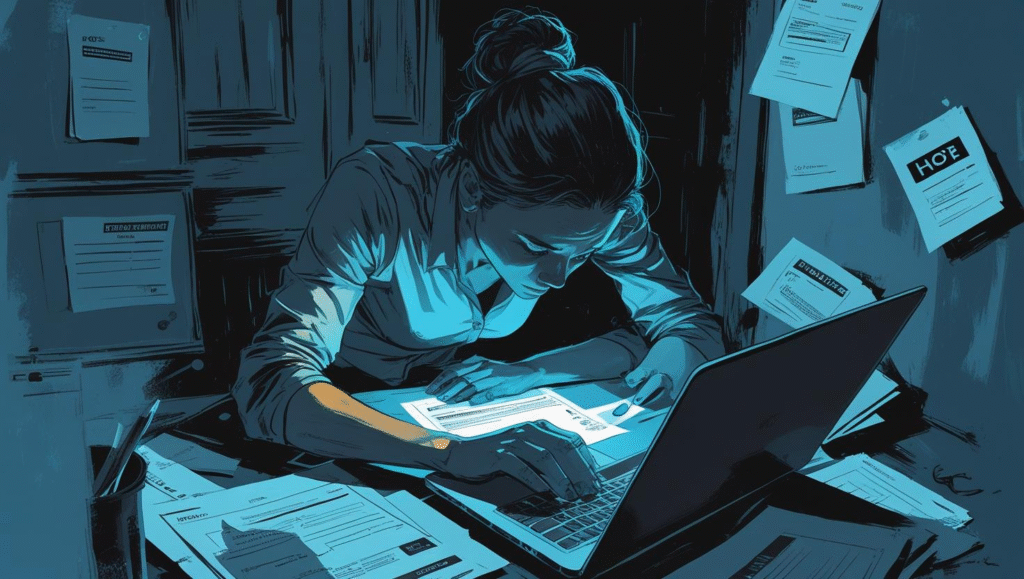Impostor syndrome affects up to 78% of business owners and entrepreneurs, but it’s not a reflection of your actual abilities—it’s a normal psychological phenomenon that can be overcome with evidence-based strategies. You belong in the freelancing world, and there are proven ways to silence that inner critic for good.
Starting your freelance journey is equal parts exhilarating and terrifying. You’ve finally taken the plunge into working for yourself, but there’s a nagging voice in your head whispering uncomfortable questions: “What if they find out I don’t really know what I’m doing?” “Am I actually qualified for this?” “Did I just get lucky with that last client?”
If these thoughts sound familiar, you’re not alone—and you’re definitely not an impostor. You’re experiencing one of the most common psychological phenomena affecting high-achieving individuals: impostor syndrome.

The Numbers Don’t Lie: You’re in Good Company
Before we dive deeper, let’s establish just how widespread this experience really is. One survey found that, in 2022, 78% of business owners reported suffering from imposter syndrome—a dramatic increase from just 24% in 2018. Among entrepreneurs specifically, most entrepreneurs and small business owners experience impostor phenomenon, with some studies suggesting up to 70% of people have suffered from it at one point or another.
Even more telling: 71% of US CEOs experience symptoms of imposter syndrome in their role, according to a 2024 study by Korn Ferry involving 10,000 professionals. The research revealed that senior management, including CEOs (71%) and other senior executives (65%) are more likely than early-stage professionals (33%) to exhibit signs of imposter syndrome.
This isn’t a character flaw—it’s a normal response to challenging yourself and growing professionally.
What Exactly Is Impostor Syndrome?
Imposter syndrome (IS) is a behavioural health phenomenon described as self-doubt of intellect, skills, or accomplishments among high-achieving individuals. These individuals cannot internalize their success and subsequently experience pervasive feelings of self-doubt, anxiety, depression, and/or apprehension of being exposed as a fraud in their work, despite verifiable and objective evidence of their successfulness.
The phenomenon was first described in 1978 by Suzanne Imes, Ph.D., and Pauline Rose Clance, Ph.D. as an observation first among successful women and other marginalized groups. However, decades of research have shown it affects people across all demographics, though women scored higher than men with a mean effect size (Cohen’s d) of 0.27 in a comprehensive meta-analysis of over 40,000 participants.
For freelancers, this manifests in particularly challenging ways. Unlike traditional employees who receive regular feedback and validation from supervisors, freelancers often work in isolation, making them especially vulnerable to self-doubt.

“I knew that if I failed I wouldn’t regret that, but I knew the one thing I might regret is not trying”.
– Jeff Bezos
Why Freelancers Are Sitting Ducks for Impostor Syndrome
The Isolation Factor
Working alone means you’re missing those casual conversations with colleagues that naturally validate your expertise. There’s no boss dropping by to say “great work on that project” or teammates to bounce ideas off. This isolation can create an echo chamber of self-doubt.
Constant Client Acquisition
Unlike employees with steady paychecks, freelancers must continuously prove their worth to new clients. This constant “audition” process can fuel feelings of inadequacy, especially when facing rejection or competing with other freelancers.
Wearing All the Hats
As a freelancer, you’re not just a specialist in your field—you’re also the salesperson, accountant, customer service rep, and business strategist. Feeling overwhelmed by responsibilities outside your core expertise is completely normal, but it can trigger impostor feelings.
Comparison Trap
Social media and freelance platforms make it easier than ever to compare yourself to others. Seeing other freelancers’ highlight reels can make you question your own abilities and achievements.

The Hidden Costs of Impostor Syndrome
Left unchecked, impostor syndrome doesn’t just affect your confidence—it can seriously damage your business and wellbeing. Recent public health research on the impact of the condition on health professionals suggests that upward of 45% of people with imposter syndrome may experience burnout at some point in their career.
Professional Impact:
- Undercharging for services due to perceived lack of worth
- Avoiding opportunities for growth or high-profile projects
- Over-delivering to compensate for “not being good enough”
- Procrastination and perfectionism that slows project completion
Personal Impact: Research consistently shows that impostor syndrome correlates with depression, anxiety, low self-esteem, somatic symptoms, and social dysfunctions. For some, impostor feelings among high school students correlated significantly with a history of prior suicidal ideation and attempts and depression.
Never be limited by other people’s limited imaginations
Mae Jemison



Evidence-Based Strategies That Actually Work
The good news is that impostor syndrome is highly treatable. While the published literature included no studies of interventions to treat impostor syndrome specifically, mental health professionals recommend evidence-based treatments for comorbid conditions such as cognitive behavioral therapy for depression and anxiety, along with targeted strategies for impostor feelings.
1. Build Your Evidence Bank
The Strategy: Create a comprehensive record of your accomplishments, positive feedback, and successful outcomes.
Why It Works: Cognitive Behavioural Therapy (CBT) is an important non-pharmacological group strategy in the management of IP because it helps challenge distorted thinking patterns with concrete evidence.
How to Implement:
- Maintain a “victory file” with client testimonials, successful project outcomes, and positive feedback
- Document specific skills you’ve developed and problems you’ve solved
- Take screenshots of praising emails or messages from clients
- Keep a running list of challenges you’ve overcome
Review this evidence regularly, especially when self-doubt creeps in. Your brain needs concrete proof to counter impostor thoughts.
2. Reframe Your Negative Self-Talk
The Strategy: Challenge and restructure unhelpful thoughts using cognitive behavioural techniques.
Why It Works: A form of cognitive behavioural therapy (CBT), cognitive processing therapy (CPT) helps patients examine old, unhelpful beliefs, re-evaluate them, and replace such thoughts with new, more accurate cognitions.
How to Implement: When you catch yourself thinking “I’m not qualified for this,” ask:
- What evidence supports this belief?
- What evidence contradicts it?
- What would I tell a friend experiencing the same thoughts?
- Is this thought helping or hindering my progress?
Replace “I don’t know enough” with “I know enough to get started, and I can learn as I go.”
3. Normalize the Learning Process
The Strategy: Shift from perfectionism to a growth mindset that embraces continuous learning.
Why It Works: Expect a learning curve. Understand that some things will come more easily than others, which reduces the pressure to know everything immediately.
How to Implement:
- Publicly acknowledge areas where you’re still learning
- Share your learning journey on social media or your blog
- Seek feedback actively rather than waiting for it
- View mistakes as data points, not character flaws
4. Connect with Your Freelance Community
The Strategy: Engage with other freelancers to normalize impostor feelings and gain perspective.
Why It Works: Talking in a group setting with other people who experience impostor syndrome can be effective. In a group setting, people who share their secret feelings of shame and deception can feel relieved that they are not alone.
How to Implement:
- Join freelancer communities on platforms like Reddit, LinkedIn, or Slack
- Attend local networking events or coworking spaces
- Find a mastermind group or accountability partner
- Consider working from shared spaces occasionally to combat isolation
5. Accept and Amplify Positive Feedback
The Strategy: Consciously practice accepting compliments and internalizing positive feedback.
Why It Works: When someone gives a compliment, for example, they are offering an opportunity to connect. When we dismiss compliments, the person who is giving the compliment can feel dismissed or wonder if they did something wrong.
How to Implement:
- Practice saying “thank you” without deflecting when you receive praise
- Ask clients what specifically they valued about your work
- Request detailed testimonials that highlight your unique contributions
- Share positive feedback publicly (with permission) to reinforce your expertise
6. Teach What You Know
The Strategy: Share your knowledge through content creation, mentoring, or speaking.
Why It Works: Teaching forces you to articulate your expertise and provides external validation of your knowledge.
How to Implement:
- Answer questions on platforms like Quora or industry forums
- Write blog posts about challenges you’ve solved
- Create tutorials or guides in your area of expertise
- Mentor newer freelancers in online communities
- Speak at industry events or webinars
Story to share with our community?
Join our Social Chat
When to Seek Professional Help
While most freelancers can manage impostor syndrome with self-help strategies, the care of patients with impostor syndrome requires a careful assessment for comorbid conditions and treatment of them in addition to addressing the impostor feelings.
Consider professional support if:
- Impostor feelings are severely impacting your ability to work or find clients
- You’re experiencing symptoms of depression or anxiety
- The self-doubt is affecting your personal relationships
- You’re engaging in self-sabotaging behaviours that damage your business
Talk therapy can help manage the roots of impostor syndrome. In therapy, patients can address their reliance on others’ opinions for their self-worth. They can reframe the negative messages they have received throughout their lives about why they are not smart or capable enough.
Creating Your Impostor-Proof Freelance Mindset
Embrace the “Beginners’ Mind”
Even experts are constantly learning. The freelance landscape evolves rapidly, and staying curious and adaptable is a strength, not a weakness. Frame yourself as a lifelong learner rather than someone who should already know everything.
Redefine Success
Success isn’t about never feeling uncertain—it’s about taking action despite uncertainty. The survey showed that 64% of respondents said it’s often or very true they actually succeed at tasks they worried about failing at. Your track record of success despite fear proves you’re more capable than your impostor syndrome suggests.
Focus on Value Creation
Instead of asking “Am I good enough?” ask “How can I create value for this client?” This shifts focus from internal doubt to external impact, which is ultimately what clients care about.
Build Your “Anti-Impostor” Toolkit
Daily Practices:
- Morning affirmations focused on your capabilities and achievements
- End-of-day wins journaling (even small victories count)
- Regular skills assessment to track your growth
Weekly Practices:
- Review and update your portfolio with recent work
- Reach out to past clients for feedback or potential new projects
- Engage in one learning activity related to your field
Monthly Practices:
- Analyse your impostor syndrome triggers and patterns
- Update your “evidence bank” with new accomplishments
- Set realistic goals that challenge but don’t overwhelm you
The Truth About Expertise
Here’s something that might surprise you: people with impostor syndrome underestimate their competence, this other group generally overestimates it. The Dunning-Kruger effect describes this odd relationship where self-assessed competence is often inversely proportional to actual competence.
In other words, the fact that you’re questioning your abilities might actually indicate that you’re more competent than you think. True experts are aware of how much they don’t know, while incompetent people often overestimate their abilities.
Your Impostor Syndrome Action Plan
Week 1-2: Build Awareness
- Track impostor thoughts in a journal for two weeks
- Identify your specific triggers and patterns
- Create your initial “evidence bank” of past successes
Week 3-4: Challenge and Reframe
- Practice the cognitive restructuring techniques daily
- Begin sharing one piece of your expertise publicly
- Connect with one new person in your freelance community
Month 2: Expand and Reinforce
- Expand your evidence collection to include client feedback
- Take on one project that slightly stretches your comfort zone
- Begin teaching or mentoring others in some capacity
Month 3 and Beyond: Maintain and Grow
- Regular review and update of your anti-impostor toolkit
- Continued community engagement and knowledge sharing
- Professional help if self-help strategies aren’t sufficient

The Reality Check You Need
Let’s address the elephant in the room: you chose to become a freelancer, and that alone required courage that many people don’t possess. You’ve successfully completed projects, satisfied clients, and built a business from scratch. These aren’t accidents or flukes—they’re evidence of your capabilities.
Even some of the most powerful, respected, and high-achieving women globally — Michelle Obama, Maya Angelou, Tina Fey, and an estimated 75% of women executives — have struggled with impostor syndrome from time to time. These successful women prove that impostor feelings are just that, not a true reflection of their abilities.
Moving Forward with Confidence
Impostor syndrome thrives on secrecy and isolation. The more you understand it, talk about it, and implement strategies to counter it, the less power it has over your freelance career.
Remember: you don’t need to eliminate impostor syndrome entirely—that’s unrealistic and unnecessary. The goal is to recognize it for what it is (a normal psychological response to growth and challenge), implement evidence-based strategies to manage it, and continue taking action toward your goals despite occasional self-doubt.
Your freelance journey is valid, your skills are real, and your success is deserved. The sooner you internalize this truth, the sooner you can focus on what really matters: delivering exceptional value to your clients and building the freelance career you envisioned.
Final Thought: The next time impostor syndrome whispers “you don’t belong here,” remember that it’s not based in reality—it’s based in fear. And fear, unlike facts, can be overcome with the right strategies, support, and mindset.
You’ve got this. The evidence bank proves it, the research supports it, and your future clients are waiting for exactly what you have to offer.
Your First Steps to Freelance Freedom
